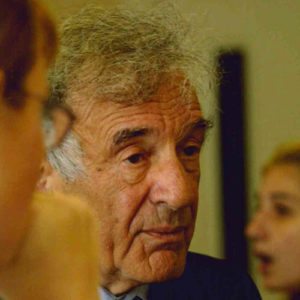Making the World More Human
I’ll never forget this moment. There I was, sitting in a small, book-lined office on the campus of a school I had never heard of just four months before. Seated next to me was the greatest moral voice of our time, and one of the most respected human beings on the planet: Elie Wiesel. As the new campus rabbi at Eckerd College in St. Petersburg, Florida, I was amazed to learn that Professor Wiesel had a longstanding relationship with the school and has been teaching during Eckerd’s Winter Term every year since 1993.
As the two of us sat in his office, my heart pounded in my chest and my stomach climbed to my throat. Introductions were made, and I said, “I have only one question for you: What are you doing here?”
He leaned toward me in his chair, smiled and said, “Oh, I love the weather.”
I immediately recalled those scenes in the Talmud in which a heathen asks a question of a great rabbi. The rabbi gives a simplistic answer, and the heathen leaves feeling as if he has gained the world. However, the disciples of the rabbi always say: “That’s good enough for him, but now tell us the real answer.” At which point the rabbi delves into profound teachings.
I looked at Professor Wiesel and said, “Of course we all love the weather, but what are you really doing here?”
He paused, looked at me with his knowing eyes, leaned back in his chair and said, almost in a whisper: “I have taught everywhere in the world. And I’ve found that the best students at Eckerd College are as good as the best students anywhere. And that’s why I keep coming back.” I knew at that moment that I, like the great man sitting before me, had found a hidden treasure on the shore of Tampa Bay.
For the past seven years, I have eagerly awaited Winter Term at Eckerd College, and the return of Elie Wiesel to our campus. Everyone knows about his longstanding position at Boston University, but Eckerd College was his secret, his refuge. In his 2012 book Open Heart, Wiesel wrote, “For several years I have been teaching a class in philosophy, history and literature at a small, prestigious college.” A small college that few people have ever heard of, which allowed him peace and quiet for three months out of the year to read, to write, to think and to teach.
His class was not even listed in the course catalog. Students had to apply to be accepted, and it was limited to a maximum of 20 students. Imagine sitting in a small room, just 20 students and Elie Wiesel, for two hours five days a week for a month. In his classes, everything he said was like gold, but four simple words from the mouth of Elie Wiesel have become almost a mantra for students at Eckerd College: “In everything you do, think higher, feel deeper.”
While Elie Wiesel spoke at Hillels and other venues around the world to packed auditoriums, for the past seven years his fireside chats with our student leaders were unparalleled. During these chats, Professor Wiesel would sit in the faculty lounge with our students, and for two hours or more, they could ask him anything.
And they did.
The conversations ranged from the current state of the world to what made him happy and everything in between. “The mission of the Jewish people,” he told them, “is not to make the world more Jewish. The mission of the Jewish people is to make the world more human.”
And while Professor Wiesel’s speaking honorarium could run into the tens of thousands of dollars, our fireside chats cost our Hillel just a small plate of apricot rugelach.
His last fireside chat with our students was in March. He seemed tired, but his mind was as keen as ever. For all these years he has carried the weight of the Shoah and the responsibility to bear witness to it on his shoulders. It was an impossible burden to bear, but he did it with strength, courage and dignity.
With the passing of Elie Wiesel, the world has lost its conscience, and its strongest advocate for human rights. The Jewish people have lost our towering figure of compassion, memory and hope. My students and I have lost our greatest teacher … and our friend.
May his memory be a blessing.
—Ed Rosenthal (P ’16)
Campus Rabbi, Eckerd College
Executive Director, Hillels of the Florida Suncoast


